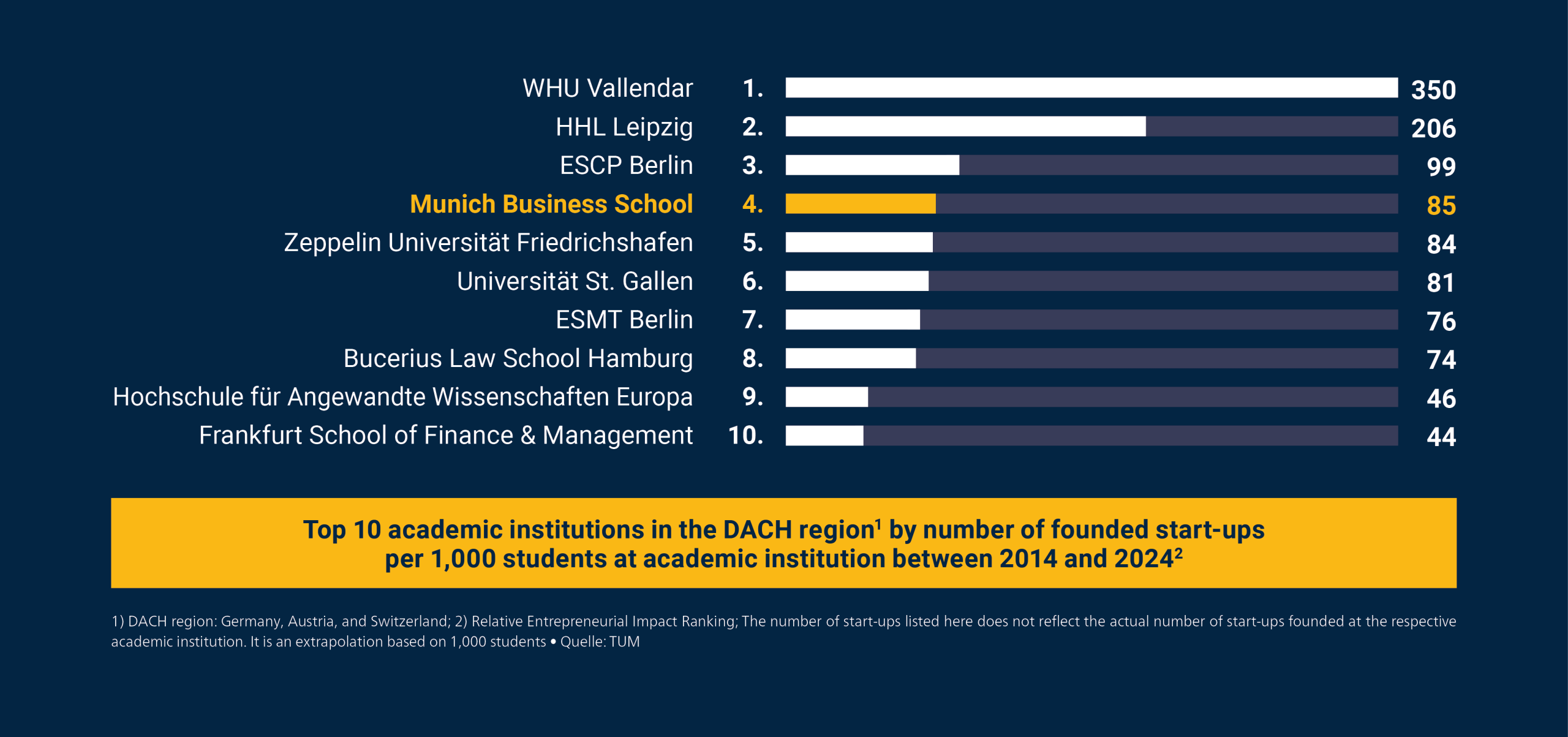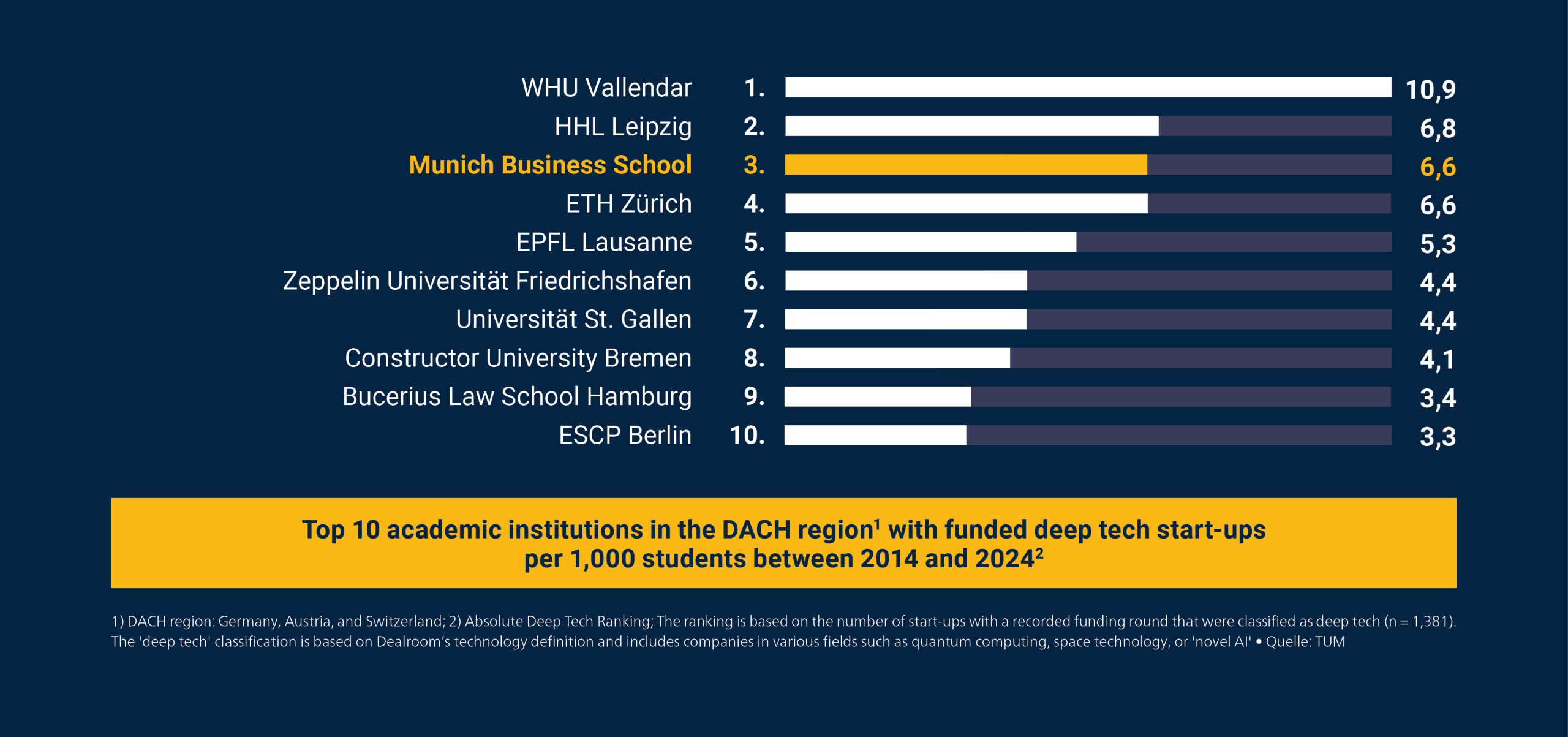
Innovation and start-ups are essential for remaining economically competitive. A new scientific study shows the role universities play in the creation of start-ups – and which type of university is particularly strong in this area. Munich Business School scores top marks.
Entrepreneurial spirit and a culture of innovation have always been part of Munich Business School’s (MBS) DNA. Modules on entrepreneurship have been an integral part of the traditional Bachelor’s and Master’s programs in International Business for years. In 2019, the Master’s program in Innovation and Entrepreneurship was introduced with steadily growing success, and the university’s internal event series MBS Start-up Spirit presents successful founders from the university’s alumni network several times a year.
A scientific cross-national study has now clearly positioned Munich Business School as a university for start-ups and innovation beyond the boundaries of the university for the first time. For the study, which was recently presented exclusively in the Handelsblatt, scientists from the Technical University of Munich (TUM), ETH Zurich, and the University of Innsbruck linked and evaluated various data sources on start-up activity, such as start-up databases and LinkedIn profiles. They came to some remarkable conclusions: with 85 start-ups per 1,000 students between 2014 and 2024, Munich Business School is one of the strongest universities for start-ups in the DACH region – ranking fourth overall. In Bavaria, it is even number one in terms of start-up activity.

It is noteworthy that private universities clearly dominate this ranking, which compares the number of start-ups founded to the number of students. Twelve of the top 15 places are occupied by private German (business) universities – ahead of MBS are WHU Vallendar, HHL Leipzig, and ESCP Berlin, and behind them are Zeppelin University Friedrichshafen and Frankfurt School of Finance & Management. While the state-run TU Munich produces the most start-ups in absolute terms, it lags behind in the relative ranking, similar to its competitors TU Berlin and RWTH Aachen. Private universities are significantly more productive. At Munich Business School, for example, there is one start-up for every 12 students. Dr. Nadine Chochoiek, Professor of Innovation and Entrepreneurship and Academic Director of the corresponding Master’s program at Munich Business School, knows why this is the case:

“Private universities, and Munich Business School in particular, often offer a more agile environment for entrepreneurial thinking. Small groups, the development of a deep understanding of real problems in business and society, and direct exchange with and honest feedback from founders and investors make it possible to provide relevant impetus and promote start-up skills in a targeted manner. The fact that so many of our students go on to launch start-ups is no coincidence, but rather the result of our clear educational goal: to educate people who think globally, take responsibility, and shape the future with innovative strength.”
But why are start-ups so important for a developed economy? The answer is simple: without start-ups, there is no progress, just stagnation – not only economically, but at all levels of society. Innovation boosts productivity, ensures competition – both nationally and internationally – and enables economic independence. New companies create future-proof jobs, attract young talent in particular, and thus increase the attractiveness of business locations. At the same time, they drive cultural change toward greater dynamism, risk-taking, and creativity. Ultimately, innovation is needed to solve key societal challenges, whether in climate change, demographic development, or healthcare.
In Germany, nine out of ten founders have an academic degree. In short, this means that without universities, there would be no innovation. Deep tech start-ups, i.e., new companies based on cutting-edge technology in the fields of quantum technology, aerospace, and artificial intelligence, are considered to be particular drivers of innovation. The TUM study also provides interesting insights into this area – once again with positive results for Munich Business School. In absolute terms, state-run technical universities dominate here once again, with ETH Zurich and TU Munich at the top of the rankings. In relative terms, however, private business schools in Germany perform better. With almost seven deep tech start-ups per 1,000 students, Munich Business School ranks an outstanding third ahead of ETH Zurich – even though there are no scientific or technical facilities on campus.

These results clearly show that technical knowledge alone is not enough to successfully launch a start-up; economic understanding is also required.
So what happens next? How can the results of this new study be used? Prof. Dr. Nadine Chochoiek explains:
“For us, this is a clear incentive to further expand our offerings – always with the goal of providing our students with the best possible environment for entrepreneurial thinking, responsible action, and real impact. Our strength lies in our close cooperation with partners from business, science, and society—and in the excellent training of talented individuals who are ready to work at the decisive interfaces. The study shows that innovation arises where perspectives and skills come together. This is precisely where we see our role as a business school – as a bridge builder, translator, and catalyst. Now it is time to work together to leverage the existing potential – in Munich and far beyond – even more effectively: through targeted cooperation, effective support structures, and an environment in which entrepreneurial ideas can have a rapid and lasting impact.”



